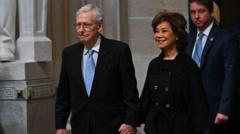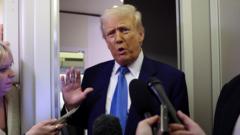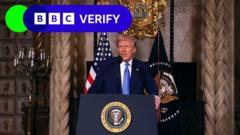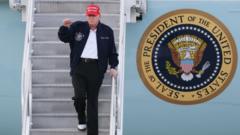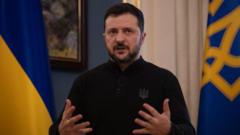Global leaders are grappling with conflicting agendas, questioning the consequences of peace without Ukrainian involvement.
**Competing Interests Shape Ukraine War Talks Amid International Tensions**
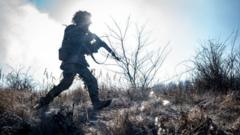
**Competing Interests Shape Ukraine War Talks Amid International Tensions**
In a pivotal week, key international players convene in Paris and Saudi Arabia, as the Ukraine conflict's future hangs in the balance.
The high-stakes diplomatic meetings unfolding this week, with significant talks occurring in Paris and Riyadh, represent a critical junction in the ongoing Ukraine conflict. Notably, Ukraine itself will not be represented at either venue, prompting widespread concern about the implications of any agreements that fail to involve its interests directly.
On Monday, the focus shifts to European leaders gathered in Paris, responding to the evolving political landscape as negotiations with Russia gain momentum under former US President Donald Trump. UK Labour leader Sir Keir Starmer aspires to enhance European support for Ukraine while addressing defense spending. His proposal to deploy British troops to Ukraine aims to secure confidence among allies while countering aggressor threats. However, back at home, the UK Parliament wrestles with rising defense costs against a backdrop of economic challenges.
Meanwhile, Germany's Chancellor Olaf Scholz joins the Paris talks under pressure to maintain a united front against Russian aggression, despite facing a national election. A coalition of political factions in Germany stands firm against America's inclination to negotiate the war's outcome without broader European input. Concerns over sovereignty and the ramifications of a hastily brokered peace deal weigh heavily on German leaders, who must balance their historical caution with the need for military preparedness.
Poland's Prime Minister Donald Tusk, representing a staunch ally of Ukraine, emphasizes the existential threat posed by Russia's actions, urging increased defense investment for European nations. The Polish government remains cautious about sending troops to Ukraine, echoing sentiments shared with Baltic nations that feel particularly vulnerable to Russian encroachment.
In Denmark, Prime Minister Mette Frederiksen's attendance at the Paris talks highlights the chill in transatlantic relations spurred by Trump's recent rhetoric and ambitions. Discussions among European leaders address the need to coordinate a unified response to maintain security in the face of uncertainty.
The scene shifts to Riyadh on Tuesday, where the focus shifts primarily to the US-Russia dialogue. Russian Foreign Minister Sergei Lavrov signals a desire to engage with US proposals while presenting firmly held demands, including the recognition of Russian-held territories in Ukraine. Moscow's long-standing interest in direct dialogue with Washington as a counterweight to European influence is evident.
On the US side, Secretary of State Marco Rubio is tasked with tackling the complexity of the negotiations. Trump's vision for Ukraine appears centered on minimizing US involvement, creating apprehension among European allies regarding the absence of a clear post-war structure for Ukraine.
As the Ukrainian perspective is eclipsed in these discussions, President Volodymyr Zelensky communicates the importance of Ukraine's agency in the peace talks. The resistance to any agreements made without Ukrainian input underscores a broader fear of repeating past mistakes that disregarded Ukraine's sovereignty and security needs.
As the outcomes of these meetings unfold, it is clear that the interplay of national interests, historical burdens, and conflicting visions for a future Ukraine will continue to define the discourse surrounding this critical geopolitical struggle.
On Monday, the focus shifts to European leaders gathered in Paris, responding to the evolving political landscape as negotiations with Russia gain momentum under former US President Donald Trump. UK Labour leader Sir Keir Starmer aspires to enhance European support for Ukraine while addressing defense spending. His proposal to deploy British troops to Ukraine aims to secure confidence among allies while countering aggressor threats. However, back at home, the UK Parliament wrestles with rising defense costs against a backdrop of economic challenges.
Meanwhile, Germany's Chancellor Olaf Scholz joins the Paris talks under pressure to maintain a united front against Russian aggression, despite facing a national election. A coalition of political factions in Germany stands firm against America's inclination to negotiate the war's outcome without broader European input. Concerns over sovereignty and the ramifications of a hastily brokered peace deal weigh heavily on German leaders, who must balance their historical caution with the need for military preparedness.
Poland's Prime Minister Donald Tusk, representing a staunch ally of Ukraine, emphasizes the existential threat posed by Russia's actions, urging increased defense investment for European nations. The Polish government remains cautious about sending troops to Ukraine, echoing sentiments shared with Baltic nations that feel particularly vulnerable to Russian encroachment.
In Denmark, Prime Minister Mette Frederiksen's attendance at the Paris talks highlights the chill in transatlantic relations spurred by Trump's recent rhetoric and ambitions. Discussions among European leaders address the need to coordinate a unified response to maintain security in the face of uncertainty.
The scene shifts to Riyadh on Tuesday, where the focus shifts primarily to the US-Russia dialogue. Russian Foreign Minister Sergei Lavrov signals a desire to engage with US proposals while presenting firmly held demands, including the recognition of Russian-held territories in Ukraine. Moscow's long-standing interest in direct dialogue with Washington as a counterweight to European influence is evident.
On the US side, Secretary of State Marco Rubio is tasked with tackling the complexity of the negotiations. Trump's vision for Ukraine appears centered on minimizing US involvement, creating apprehension among European allies regarding the absence of a clear post-war structure for Ukraine.
As the Ukrainian perspective is eclipsed in these discussions, President Volodymyr Zelensky communicates the importance of Ukraine's agency in the peace talks. The resistance to any agreements made without Ukrainian input underscores a broader fear of repeating past mistakes that disregarded Ukraine's sovereignty and security needs.
As the outcomes of these meetings unfold, it is clear that the interplay of national interests, historical burdens, and conflicting visions for a future Ukraine will continue to define the discourse surrounding this critical geopolitical struggle.


